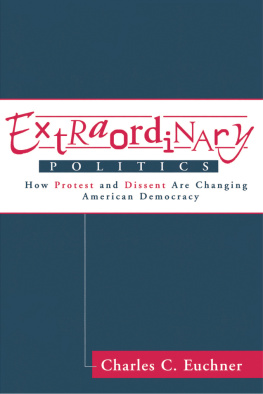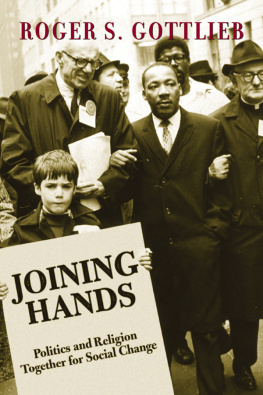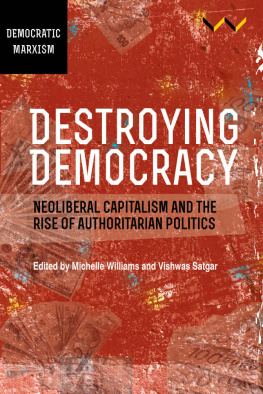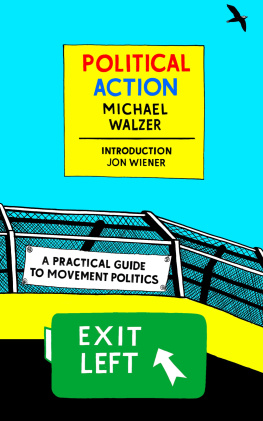Extraordinary Politics
Transforming American Politics
Lawrence C. Dodd, Series Editor
Dramatic changes in political institutions and behavior over the past three decades have underscored the dynamic nature of American politics, confronting political scientists with a new pressing intellectual agenda. The pioneering work of early postwar scholars, while laying a firm empirical foundation for contemporary scholarship, failed to consider how American politics might change or recognize the forces that would make fundamental change inevitable. In reassessing the statistic interpretations fostered by these classic studies, political scientists are now examining the underlying dynamics that generate transformational change.
Transforming American Politics brings together texts and monographs that address four closely related aspects of change. A first concern is documenting and explaining recent changes in American politicsin institutions, processes, behavior, and policymaking. A second is reinterpreting classic studies and theories to provide a more accurate perspective on postwar politics. The series looks at historical change to identify recurring patterns of political transformation within and across the distinctive eras of American politics. Last and perhaps most important, the series presents new theories and interpretations that explain the dynamic processes at work and thus clarify the direction of contemporary politics. All of the books focus on the central theme of transformationtransformation in both the conduct of American politics and in the way we study and understand its many aspects.
Forthcoming Titles
The Divided Democrats: Ideological Unity,
Party Reform, and Presidential Elections ,
William G. Mayer
Revolving Gridlock ,
David Brady and Craig Volden
New Media in American Politics ,
Richard Davis and Diana Owen
Governing Partners: State-Local Relations in the United States ,
Russell L. Hanson
The States and Governing in the 21st Century ,
David M. Hedge
Seeing Red: How the Cold War Shaped American Politics ,
John Kenneth White
The Tragic Presidency ,
Robert L. Lineberry
Congress and the Administrative State, Second Edition ,
Lawrence C. Dodd and Richard L. Schott
Extraordinary Politics
How Protest and Dissent Are Changing American Democracy
Charles C. Euchner
To our next generation:
Gregory and Richard Euchner, Christopher, Benjamin, and Carlos Casarez, and Michael and Danielle Giangrasso
Transforming American Politics
First published 1996 by Westview Press
Published 2018 by Routledge
711 Third Avenue, New York, NY 10017, USA
2 Park Square, Milton Park, Abingdon, Oxon OX14 4RN
Routledge is an imprint of the Taylor & Francis Group, an informa business
Copyright 1996 Taylor & Francis
All rights reserved. No part of this book may be reprinted or reproduced or utilised in any form or by any electronic, mechanical, or other means, now known or hereafter invented, including photocopying and recording, or in any information storage or retrieval system, without permission in writing from the publishers.
Notice:
Product or corporate names may be trademarks or registered trademarks, and are used only for identification and explanation without intent to infringe.
Euchner, Charles C.
Extraordinary politics: how protest and dissent are changing
American democracy / Charles C. Euchner.
p. cm.
Includes bibliographical references and index.
ISBN 0-8133-2905-1 (alk. paper.). ISBN 0-8133-2906-X (pbk.:
alk. paper)
1. Political participationUnited States. 2. Social movementsUnited States. I.
Title.
JK1764.E93 1996
324.6'0973dc20
96-8446
CIP
ISBN 13: 978-0-8133-2906-2 (pbk)
An ancient proverb warns about wishing to live in interesting times. Whatever the stimulation and opportunity they offer, interesting times also present instability and unease that threaten the best of a society's people and institutions. In many ways, this book explores the contemporary American dimensions of this ancient truth.
The United Statesindeed, the worldnow lives in dangerously interesting times. Old approaches to politics have fallen into disfavor, sometimes violently. Global alliances and mores have been rended Economic and social arrangements that once seemed "natural," ranging from a steady job to old ethnic neighborhoods, have come into question. Relations among groups have changed, Basic institutionsgovernments, corporations, churches, unionshave lost the special legitimacy that attracted followers for generations.
A simple listing of our time's extraordinary events underscores the pace and power of political and social change. Consider the great events of recent American history: the civil rights movement, the Vietnam War, the campus unrest of the 1960s and continuing battles over multiculturalism and university investment portfolios, the feminist revolution, the bitter battles over abortion, environmentalism, the struggles of migrant laborers and other workers, the gay rights movement, the grassroots response to AIDS, neighborhood preservation movements, demonstrations for human rights in the United States and abroad, the state militia movements, animal rights crusades, and acts of terrorism from the Oklahoma City bombing to the Unabomber. Globally, consider the fall of the Soviet Empire, the end of the Cold War, Tiananmen Square, Nelson Mandela's rise to power in South Africa, the revolts of indigenous peoples from North America to Asia.
These events share a common denominator. They represent a rejection of ordinary politics, a determination to work outside the formal structures of politics. All across the United States and around the globe, millions of people have decided that protest offers the best opportunity to put pressure on the political and economic "system." Millions of people have decided that the ordinary system of politics lacks legitimacy and that the only way to practice democratic politics is to operate outside that system.
This book is an attempt to assess with the political and social movements that have shaped American politics in the postWorld War II era. The book begins with an exploration of the limits of ordinary politics ().
The idea for this book came in the fall of 1990 when I was asked at the College of the Holy Cross to teach a class on political and social movements. I desperately needed an overview of the theory of protest politics to accompany the numerous case studies and analytic articles that I planned to assign in the course. I looked in vain for a book that both summarized the magnificent literature on protest movements and placed the movements into the larger context of the American constitutional order.
I do not offer a new theory of American politics or of political and social movements in this book. Instead, I attempt to provide an overview of the impressive literature on activism and to put it all into context. Although activism has been at the center of politics since the 1960s, mainstream media, academic studies, and politicians tend to discount its importance. No major news publication, for example, covers activism in any systematic way. The "beat" system assigns reporters to cover the branches of federal government, state and local politics, technology, education and social policy, film, fashion, and sports; but no beat exists for activism. Whatever coverage activism gets is in the context of something else, never as a phenomenon with distinctive importance.










